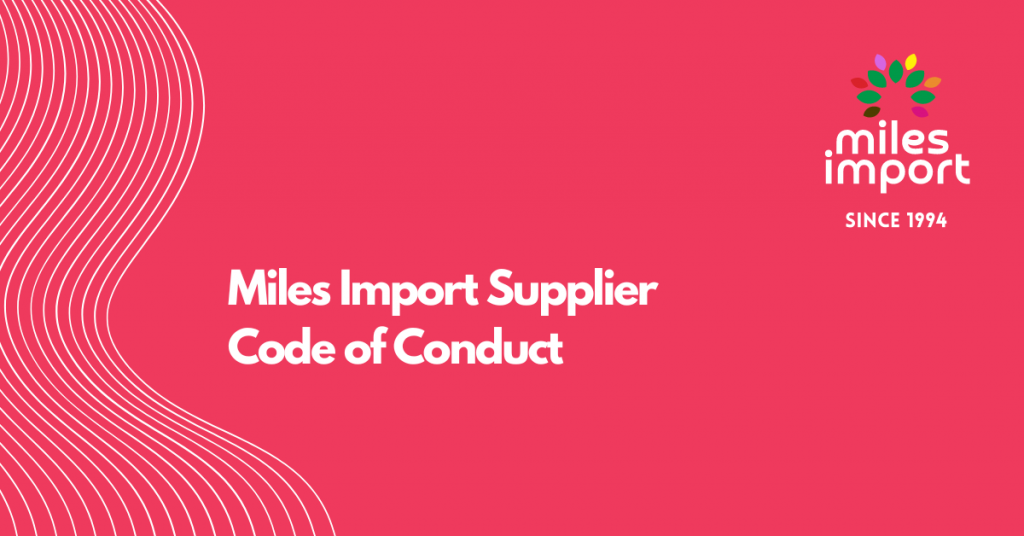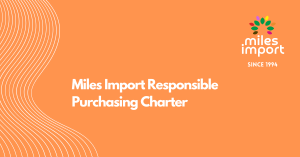At Miles Import, we are firmly committed to promoting responsible practices throughout our supply chain. This Supplier Code of Conduct sets out the ethical, social, and environmental standards that we expect from our partners. By placing sustainability at the heart of our priorities, we are inspired by the principles of the United Nations Global Compact to guide our actions and those of our suppliers.
Miles Import’s CSR Priorities:
- Fighting hunger
- Access to healthcare
- Access to clean water and sanitation
- Eradication of poverty
- Access to quality education
- Combating climate change
- Gender equality
Purpose and Scope
The Miles Import Supplier Code of Conduct aims to translate the company’s values into guidelines to guide the actions of our suppliers.
This Code applies to all direct suppliers of Miles Import, who are also encouraged to share and promote its application to their own suppliers, thus contributing to the overall sustainability of the entire supply chain.
Normative and Regulatory Framework
This Code is based on several international standards and conventions, including:
- Ethical Trading Initiative
- International Labour Organization (ILO) Code on Safety and Health
- The eight ILO Fundamental Conventions
- United Nations Universal Declaration of Human Rights
- United Nations Convention on the Rights of the Child
- Additional Protocol to the United Nations Convention Against Transnational Organized Crime to Prevent, Suppress, and Punish Trafficking in Persons
- United Nations International Covenant on Civil and Political Rights
- United Nations Convention Against Corruption
- United Nations Convention on Biological Diversity
- Rio Declaration on Environment and Development
- United Nations Agenda 2030 and Sustainable Development Goals
- United Nations Global Compact Principles
- OECD Guidelines for Multinational Enterprises (2011)
- ISO 20400:2017 Sustainable Procurement – Guidelines
- Charter of Fundamental Rights of the European Union
- Council of Europe Convention on Preventing and Combating Violence Against Women (Istanbul Convention)
CSRD Directive
The European Union Corporate Sustainability Reporting Directive (CSRD) imposes increased transparency and sustainability reporting obligations. Miles Import is committed to meeting the requirements of the CSRD and expects its suppliers to provide all necessary information to comply with this directive, including transparency on sustainability practices and implementing measures to minimize negative environmental and social impacts.
Information Protection
Suppliers must ensure the confidentiality of personal data and confidential information related to Miles Import or other parties. This information must be processed in accordance with applicable regulations and industry practices.
Quality, Safety, and Traceability
Suppliers must ensure product safety compliance and meet Miles Import’s requirements for quality, residues, traceability, and certification of products or processes.
Non-Discrimination
Suppliers must ensure that no harassment or discrimination occurs in the workplace. They must treat all employees fairly, respectfully, and with dignity, avoiding any form of discrimination in recruitment and labor relations management.
Employment is Freely Chosen
Forced labor practices are unacceptable. Suppliers must:
- Ensure a comprehensible employment contract for the employee.
- Allow workers to leave their jobs with sufficient notice.
Freedom of Association and Collective Bargaining
Suppliers must allow workers to join a union and participate in collective bargaining. Workers should be able to communicate openly and express their opinions without fear of retaliation.
Working Hours
Working hours must comply with national legislation and collective agreements. Workers must receive the legally mandated days off. Overtime must be used responsibly.
Compliance with Local and International Laws and Regulations
Suppliers must always act in compliance with local, national, and international laws and regulations in the countries where they operate. In case of conflict between this Code and local regulatory provisions, suppliers are encouraged to apply the stricter standard. Miles Import encourages its suppliers to adhere, wherever possible, to certifiable standards in the areas of environment, occupational health and safety, social responsibility, or others.
Human Rights
Suppliers must:
- Avoid any direct or indirect negative impact on human rights.
- Prevent or mitigate any negative impact on human rights directly related to their business activities.
Suppliers must respect the human rights of all individuals interacting with them. Practices such as harassment, sexual abuse, corporal punishment, physical or psychological coercion, and any form of intimidation are not tolerated.
Human Trafficking
Practices related to human trafficking are unacceptable. No Miles Import supplier may be involved in human trafficking or benefit from it in any way.
Child Labor
Child labor is never permitted at any stage of the supply chain. Suppliers must adopt policies to enable former child workers to transition to school.
Working Conditions
This document applies to all workers employed by Miles Import suppliers, regardless of their contractual status: permanent, temporary, seasonal, interim, etc.
Remuneration
Suppliers must pay decent wages and comply with applicable regulations. Pay slips must be understandable and delivered in a timely manner.
Responsible Sourcing
Suppliers must ensure that raw materials supplied to Miles Import do not fund human rights violations or have negative social and environmental impacts.
Professional Ethics
Miles Import believes that business ethics are essential for improving reputation and fostering a strong business environment. Suppliers must adopt the highest standards of professional ethics in all their dealings.
Health and Safety
Suppliers must adopt the best safety standards for facilities and production systems, ensure a safe working environment, and comply with applicable regulations.
Environment
Suppliers must adopt the precautionary principle, monitor the environmental impacts of their activities, and set improvement targets.
Biodiversity and Deforestation
Suppliers must assess their activities’ effects on biodiversity and deforestation, taking steps to minimize negative impacts.
Reuse, Recycle, Reduce, and Recover
Suppliers must manage resources responsibly, safely handle chemicals and waste, monitor air emissions, and manage energy and water consumption.
Circular Packaging
Packaging suppliers must adopt circular packaging approaches that anticipate regulatory changes and meet stakeholder demands.
Freedom of Expression
Suppliers must guarantee freedom of speech and expression to workers regarding their working conditions.
Right to Privacy
Suppliers must ensure that personal information about their employees is protected and not obtained through illegal means.
Protection of Local Communities
Suppliers must actively address social and environmental challenges to promote sustainable partnerships with local communities.
Implementation, Sharing, and Updating
Suppliers must adopt a due diligence approach to ensure compliance with this Code, transparency, and the training of employees and subcontractors.
This Code will be regularly updated to reflect evolving standards and continuous improvement in supply chain sustainability.





